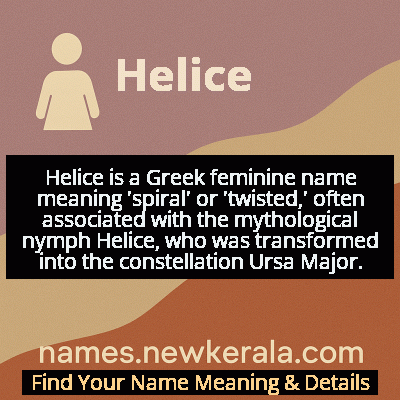Helice Name Meaning & Details
Origin, Popularity, Numerology Analysis & Name Meaning of Helice
Discover the origin, meaning, and cultural significance of the name HELICE. Delve into its historical roots and explore the lasting impact it has had on communities and traditions.
Name
Helice
Gender
Female
Origin
Greek
Lucky Number
6
Meaning of the Name - Helice
Helice is a Greek feminine name meaning 'spiral' or 'twisted,' often associated with the mythological nymph Helice, who was transformed into the constellation Ursa Major.
Helice - Complete Numerology Analysis
Your Numerology Number
Based on Pythagorean Numerology System
Ruling Planet
Venus
Positive Nature
Harmonious, responsible, caring, and artistic.
Negative Traits
Overly idealistic, superficial, possessive, or jealous.
Lucky Colours
Pink, turquoise.
Lucky Days
Friday.
Lucky Stones
Diamond, turquoise.
Harmony Numbers
2, 3, 9.
Best Suited Professions
Artists, musicians, teachers, healthcare workers.
What People Like About You
Warmth, nurturing nature, artistic flair.
Famous People Named Helice
Helice (mythological)
Nymph/Ancient Figure
One of the Ionides nymphs associated with healing springs; also a town in ancient Achaea destroyed by earthquake and tsunami
Helice (astronomical)
Celestial Body
Ancient name for the constellation Ursa Major (the Great Bear); mentioned in Greek astronomical texts
Helice of Sicyon
Ancient Priestess
Historical figure mentioned in ancient texts as a priestess of Demeter with significant religious influence
Name Variations & International Equivalents
Click on blue names to explore their detailed meanings. Gray names with will be available soon.
Cultural & Historical Significance
The ancient city of Helice in Achaea, which was destroyed by an earthquake and tsunami in 373 BCE, adds historical depth, symbolizing both the power of nature and the fragility of human civilization. Archaeological excavations beginning in the 20th century have uncovered the submerged ruins, creating a powerful narrative of loss and rediscovery. This dual symbolism of creative inspiration and natural forces makes Helice a name rich with mythological resonance, connecting bearers to both the heights of human achievement and the fundamental forces of the natural world.
Extended Personality Analysis
Individuals named Helice are often perceived as creative, intellectual, and spiritually attuned. Drawing from the name's connection to Mount Helicon and the Muses, they typically exhibit strong artistic sensibilities, analytical thinking, and a deep appreciation for knowledge and beauty. Their personality often combines the nurturing qualities associated with mythological nymphs with the intellectual rigor of scholarly pursuit. Helices tend to be intuitive problem-solvers who approach challenges with both creativity and logic.
They often possess a calm, reflective nature but can demonstrate remarkable resilience when faced with adversity, much like the ancient city that bore their name which rose and fell with natural forces. Their communication style is typically eloquent and persuasive, reflecting the rhetorical arts championed by the Muses. In social settings, Helices are often the mediators and visionaries, capable of seeing patterns and connections that others miss. They value deep, meaningful relationships and often serve as sources of wisdom and inspiration within their communities.
Modern Usage & Popularity
In contemporary times, Helice remains a rare but meaningful choice, primarily selected by parents seeking unique names with classical roots and intellectual connotations. The name has seen a slight resurgence in popularity among families with interests in classical studies, mythology, or astronomy. While not ranking in mainstream baby name lists, Helice appears occasionally in artistic and academic circles, particularly in Europe and North America. Its usage reflects a growing trend toward reviving ancient names with strong mythological backgrounds. The name's rarity makes it distinctive without being unfamiliar, appealing to parents looking for names that are both traditional and uncommon. Modern bearers often appreciate the name's connection to creativity, learning, and natural wisdom, with many choosing it specifically for its rich historical and symbolic layers rather than following naming trends.
Symbolic & Spiritual Meanings
Helice symbolizes the eternal spiral of creativity, knowledge, and natural cycles. The helical shape represents continuous growth, evolution, and the interconnectedness of all things—much like the DNA helix symbolizes life itself. As a derivative of Helicon, the name embodies the pursuit of artistic and scientific excellence, serving as a metaphor for the ascent toward enlightenment and inspiration. The mythological associations with healing springs suggest purification and emotional renewal, while the historical city's destruction and subsequent archaeological rediscovery symbolize resilience and the enduring nature of cultural legacy. Helice thus represents the beautiful tension between creation and destruction, intellectual pursuit and natural wisdom, making it a name rich with philosophical and symbolic depth that speaks to both human achievement and our relationship with the natural world.

